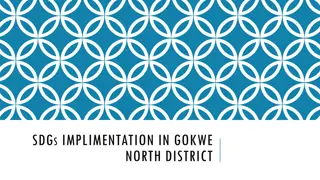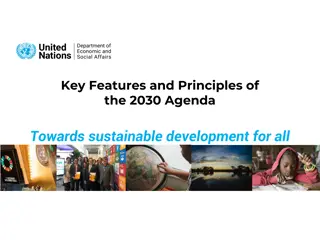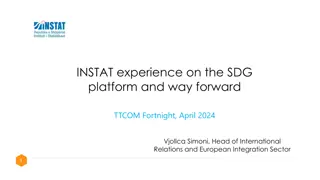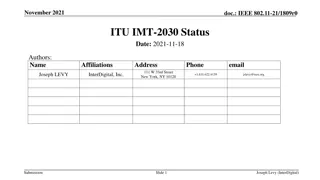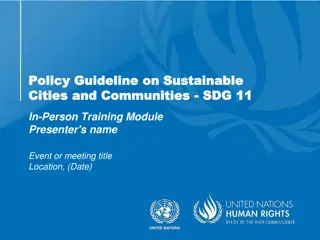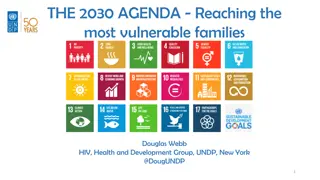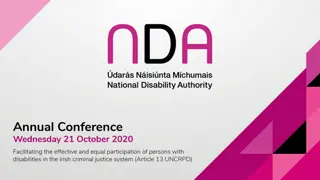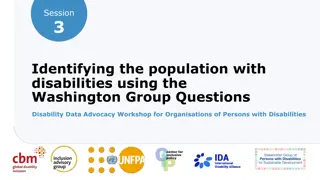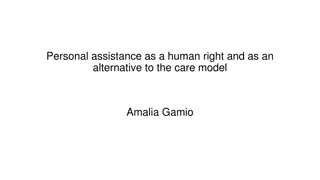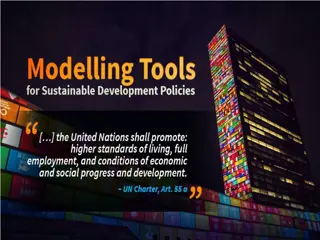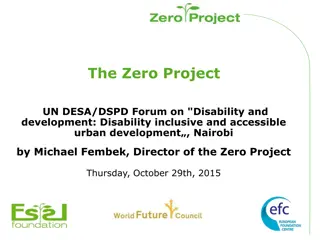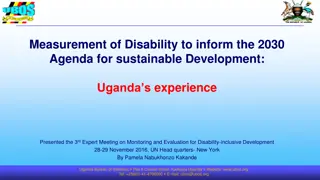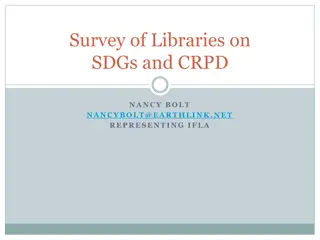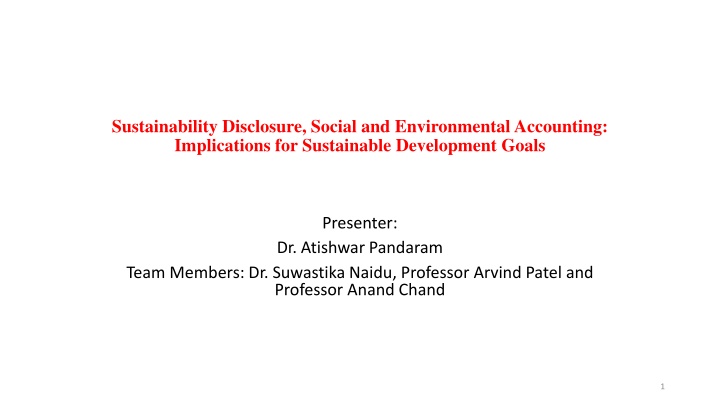
Relevance of the 2030 Agenda for Implementation of UN-CRPD
The 2030 Agenda plays a crucial role in implementing the UN-CRPD by addressing new development agendas, challenges in disability and development, and emphasizing a stronger approach to human rights. Explore the significance of the 2030 Agenda in achieving sustainable development goals and promoting inclusivity.
Download Presentation

Please find below an Image/Link to download the presentation.
The content on the website is provided AS IS for your information and personal use only. It may not be sold, licensed, or shared on other websites without obtaining consent from the author. If you encounter any issues during the download, it is possible that the publisher has removed the file from their server.
You are allowed to download the files provided on this website for personal or commercial use, subject to the condition that they are used lawfully. All files are the property of their respective owners.
The content on the website is provided AS IS for your information and personal use only. It may not be sold, licensed, or shared on other websites without obtaining consent from the author.
E N D
Presentation Transcript
Sustainability Disclosure, Social and Environmental Accounting: Implications for Sustainable Development Goals Presenter: Dr. Atishwar Pandaram Team Members: Dr. Suwastika Naidu, Professor Arvind Patel and Professor Anand Chand 1
Outline of the Presentation Outline of the Presentation 1.0 Introduction 2.0 Literature Review 3.0 Research Methodology 4.0 Research Findings and Discussions 5.0 Conclusion 2
1.0 Introduction 1.0 Introduction Sustainability disclosures (SD) involve measuring, reporting and ensuring accountability to the stakeholders for the organisations progress towards achieving sustainable development goals (Global Reporting Initiative, 2006). In recognition of the continuing emphasis on green awareness, extensive research is conducted in the area of social and environmental accounting (Johari & Komathy, 2019; Sobhani et al., 2012). Small Island Developing Countries (SIDS s),including Fiji Islands are far behind in the area of sustainability research. 3
But first, But first, ? How can the success of an business firms be measured? 4
Triple Bottom Line Approach Triple Bottom Line Approach (1) Financial Performance (2)Environmental Performance (3)Social Performance 5
Triple bottom line Triple bottom line Howard et al. (2016) 6
2.0 Literature Review 2.0 Literature Review Globally, one of the major agenda items for top businesses is sustainable development (Johari & Komathy, 2019). Stakeholders have shown great interest on issues concerning sustainable capital markets (Ofoegbu et al., 2018). Organisations are now reporting their sustainability practices on their websites and annual reports. Most of the developed countries have recognized CSD with Japan leading the list of the countries (Johari & Komathy, 2019; Sobhani et al., 2012). 7
Sustainability: Triple bottom line Sustainability: Triple bottom line John Elkington, 1994 for sustainable development, examine: People (social) Planet (environment) Profits (economic) 8
2.1 Literature Review ( 2.1 Literature Review (Con t Con t) ) The leading authors in the area of sustainability disclosure, social and environmental accounting are Johari & Komathy (2019), Aifuwa (2019), Ofoegbu et al. (2018), Joseph (2016), and Sobhani et al., (2012). Only a limited number of studies have examined triple bottom line reporting in SIDS s (Johari & Komathy, 2019; Sobhani et al., 2012). Lodhia (2000) carried out content analysis 8 listed companies in the South Pacific Stock Exchange and found that the reporting by public companies is focused on enhancing their public image. This study found that the larger companies disclosed more social information as compared to small companies. 9
2.1 Literature Review ( 2.1 Literature Review (Con t Con t) ) Lodhia (2003) found that accountants are conspicuously absent from environmental accounting and reporting in organisations. Why? Tanzil (2015) found that there is low level of disclosure practiced by the listed companies in Fiji. This study contributes to the existing literature as it provides insights on corporate sustainability disclosure in the small island developing countries. 10
Tools for Sustainability Tools for Sustainability Life cycle assessment (LCA) Design for the environment (DFE) Factor X (relates to eco-efficiency-doing more with less) Environmental management system (EMS) ISO 14000 (Environmental Management System) ISO 26000 (Corporate and Social Responsibility Guide Standards) Clean production Environmental impact assessment (EIS) Material flow analysis (MFA) MET (materials, energy and toxicity) Matrix 11
3.0 Research Methodology 3.0 Research Methodology The annual reports of the 11 companies listed on the South Pacific Stock Exchange were used as major sources of data. Content analysis was used to determine the level of disclosure in the annual reports and websites of the companies listed on the South Pacific Stock Exchange. Number of sentences rather than number of words was used in the content analysis. We used the latest annual report (year 2020) and assessed the website for the 11 companies. 12
3.0 Research Methodology 3.0 Research Methodology The Eight CSD themes that was used this study are: Economic -14 items Energy-9 items Natural Environment-15 items Community Disclosure-28 items HRD Disclosure-23 items Human Rights Disclosure-12 items Product Disclosure-11 items Governance Issues-13 items 13
3.1 Research Methodology 3.1 Research Methodology Twenty Companies that are listed on the South Pacific Stock Exchange are: 1. Atlantic & Pacific Packaging Company Limited (APP) 2. Amalgamated Telecom Holdings Limited (ATH) 3. Communications (Fiji) Limited (CFL) 4. Free Bird Institute Limited (FBL) 5. FijiCare Insurance Limited (FIL) 6. FMF Foods Limited (FMF) 7. Fiji Television Limited (FTV) 8. Kontiki Finance Limited (KFL) 9. Kinetic Growth Fund Limited (KGF) 10. Paradise Beverages (Fiji) Limited (PBF) 11. Pleass Global Limited (PBP) 12. Port Denarau Marina Limited (PDM) 13. Pacific Green Industries (Fiji) Limited (PGI) 14. RB Patel Group Limited (RBG) 15. The Rice Company of Fiji Limited (RCF) 16. Toyota Tsusho (South Sea) Limited (TTS) 17. VB Holdings Limited (VBH) 18. Vision Investments Limited (VIL) 19. Fijian Holdings Limited (FHL) 20. BSP Convertible Notes Limited (BCN) 14
4.0 Research Findings and Discussions 4.0 Research Findings and Discussions Table 1: Descriptive Statistics of the 11 Companies The mean for the Years in Operation and Market Capitalisation for 11 firms in our sample are 32 years and $292.88 million. Variables Minimum Maximum Mean Std. Deviation Yrs. in Operation 6 85 32 20.84 Market Capitalisati on ($) 14 1089.03 292.88 317.01 15
4.1 Research Findings and Discussions ( 4.1 Research Findings and Discussions (Con t Con t) ) Table 2: Companies Table 2: Companies Disclosure Themes Disclosure Themes Disclosure Themes Annual Report (2020) Website (2020) Economic 11 (100%) 8 (72.7%) Energy 3 (27.3%) 1(9.1%) Natural Environment 9 (81.8%) 5 (45.5.%) Community Disclosure 8 (72.7%) 5 (45.5%) HRD Disclosure 9 (81.8%) 1 (9.1%) Human Rights Disclosure 1 (9.1%) 1 (9.1%) Product Disclosure 10 (90.9%) 10(90.9%) Governance Issues 11 (100%) 9 (81.8%) 16
4.1 Research Findings and Discussions ( 4.1 Research Findings and Discussions (Con t Con t) ) Table 3: Number of Sentences Disclosed Per Disclosure Theme Disclosure Themes Annual Report (2020) Website (2020) Economic 205 99 Energy 15 18 Natural Environment 62 19 Community Disclosure 66 65 HRD Disclosure 66 23 Human Rights Disclosure 12 12 Product Disclosure 133 105 Governance Issues 263 136 17
4.1 Research Findings and Discussions ( 4.1 Research Findings and Discussions (Con t Con t) ) Table 4: Mean for the Number of Sentences Disclosed Per Disclosure Theme Disclosure Themes Annual Report (2020) Website (2020) Economic 18.6 9.0 Energy 1.4 1.6 Natural Environment 5.6 1.7 Community Disclosure 6.0 5.9 HRD Disclosure 6.0 2.1 Human Rights Disclosure 1.1 1.1 Product Disclosure 12.1 9.5 Governance Issues 23.9 12.4 18
4.1 Research Findings and Discussions ( 4.1 Research Findings and Discussions (Con t Con t) ) This study confirmed that companies with high market capitalisation engage in detailed reporting of CSD, for example, ATH in our sample has highest market capitalisation in $ s with its annual report presented for year 2020 in a detailed and succinct way on sustainability disclosure themes. Similar findings has been reported by Lodhia (2000, 2003). Companies are more likely to report on CSD in their annual reports as compared to websites. Sustainability disclosure practices adopted by the 11 companies listed on SPX helps to enrich and enhance the SDGs monitoring mechanisms, as it provides information to the stakeholders on the sustainability impact of companies listed on the South Pacific Stock Exchange. 19
5.0 Conclusion 5.0 Conclusion In summary, this presentation argued that large companies are more likely to report on CSD as compared to companies that have lower market capitalisation. CSD provides stakeholders detailed information on how effectively an organisation is working towards achieving sustainable development goals. 20
References Aifuwa, H. O., Saidu, M., Enehizena, O. C., & Osazevbaru, A. (2019). accounting information and lending decision: does sustainability disclosure matter?. Copernican Journal of Finance & Accounting, 8(4), 61-89. Elkington, J. (1994) Towards the Sustainable Corporation: Win-Win-Win Business Strategies for Sustainable Development. California Management Review, Vol 36, pp. 90-100. http://dx.doi.org/10.2307/41165746. Howard H. Frederick, Allan O Connor and Donald F. Kuratko (2016), Entrepreneurship, Theory, Process, and Practice , 4th Edition, Cengage Learning, Victoria, Australia. Johari, J., Komathy, A. (2019). Sustainability reporting and firm performance: Evidence in Malaysia.International Journal of Accounting, 4(17), 32-45. Joseph, U.B. (2016). Effect of sustainability reporting on firm s performance: A review of literature. The International Journal of Business & Management, 4(7), 203-208. Lodhia, S. K. (2000). Social and environmental reporting in Fiji: A review of recent corporate annual reports.Social and Environmental Accountability Journal, 20(1), 15-18. Lodhia, S. K. (2003). Accountants responses To The Environmental Agenda In A Developing Nation: An Initial And Exploratory Study On Fiji. Critical Perspectives on Accounting, 14(7), 715-737. Ofoegbu, G. N., Odoemelam, N., & Okafor, R. G. (2018). Corporate board characteristics and environmental disclosure quantity: Evidence from South Africa (integrated reporting) and Nigeria (traditional reporting). Cogent Business & Management,5(1), 1551510. Sharma, U., & An, Y. (2018). Accounting and Accountability in Fiji: A review and synthesis.Australian Accounting Review, 28(3), 421-427. Sobhani, F. A., Amran, A., & Zainuddin, Y. (2012). Sustainability disclosure in annual reports and websites: a study of the banking industry in Bangladesh. Journal of Cleaner Production,23(1), 75-85. Tanzil, S. (2015). The Level of Voluntary Disclosure in Annual Reports by Listed Companies in Fiji. Available at SSRN 3548434. 21

